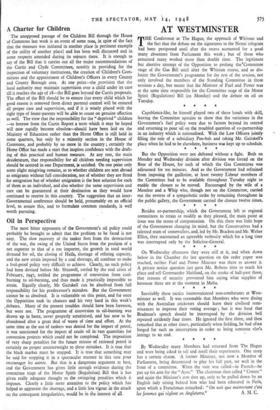AT WESTMINSTER
THE Conference at The Hague, the approach of Whitsun and the fact that the debate on the signatures to the Nenni telegram had been postponed until after the recess accounted for a good many absentees from Parliament this week ; but of those who remained many worked more than double time. The legitimate but abortive attempt of the Opposition to prolong the'Committee stage of the Gas Bill until after the Whitsun recess, and so dis- locate the Government's programme for the rest of the session, not only involved the members of the Standing Committee in three sessions a day, but meant that the Minister of Fuel and Power was at the same time responsible for the Committee stage of the Motor Spirit (Regulations) Bill (on Monday) and the debate on oil on Tuesday.
Capablanca-like, he himself played two of these hands with skill, leaving the Committee upstairs to show that the variations in the Government's fuel policy were due to factors beyond its control and returning to pour oil on the troubled question of co-partnership in an industry which is nationalised. With the Law Officers jointly filling the role of a subsidiary Poo-bah and taking Mr. Gaitskell's place when he had to be elsewhere, business was kept up to schedule. * * * * But the Opposition were not defeated without a fight. Both on Monday and Wednesday division after division was forced on the floor of the House, for each of which the Gas Committee was adjourned for ten minutes. And as the Government had refrained from imposing the guillotine, at least twenty Eabour members of the Committee had to be available throughout Tuesday night to enable the closure to be moved. Encouraged by the wife of a Member and a Whip who, though not on the Committee, carried out the reverse of a sympathetic strike by remaining throughout in
the public gallery, the Government carried the closure twelve times. * * * * Besides co-partnership, which the Government left to regional committees to retain or modify as they pleased, the main point at issue was the terms of compensation. On this there was little hope of the Government changing its mind, but the Conservatives had a talented team of stonewallers, and, led by Mr. Bracken and Mr. Walter Elliot, they maintained an agreeable verbosity which for a long time
was interrupted only by the Solicitor-General. * * * * On Wednesday afternoon they were still at it, and when down below in the Chamber the last question on the order paper was reached, neither Fuel and Power Minister was there to answer it. A private notice question just gave Mr. Robens time to reach his place and tell Commander Maitland, on the stroke of half-past three, that reasons of security prevented him saying what supplies of kerosene there are at the moment in Malta.
* * * * Inevitably these tactics inconvenienced non-combatants at West- minster as well. It was reasonable that Members who were dining with the Australian cricketers should leave their civilised remi- niscences to improve their voting average ; but it was hard that Bradman's speech should be interrupted by the division bell repeated stridently four times. He ignored the first three, and then remarked that at other times, particularly when fielding, he had often longed for such an interruption in order to bring someone else's innings to an end. * * * * By Wednesday many Members had returned from The Hague and were being asked to tell and retell their experiences. One story has a certain charm. A former Minister, not now a Member of Parliament, being determined to play his full part, sat well in the front of a committee. When the vote was called—in French—he put up his arm for the " Ayes." The chairman then called " Contra " and again the Minister's arm shot up, only to be pulled down by an English lady sitting behind him who had been educated in Paris, upon which a Frenchman remarked: "On you que maintenant c'est les femmes qui reglent en Angleterre." A. M. C.






























 Previous page
Previous page